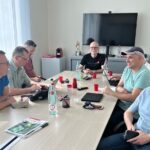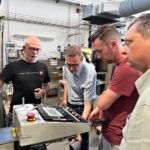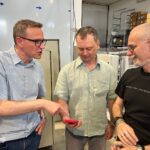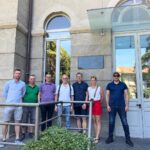Supercapacitors must be powerful yet environmentally friendly
After the Olomouc kick-off meeting, another crucial meeting of partners of the European Innovation Council (EIC) TRANS2DCHEM project took place in mid-June in Italy. The participants evaluated the progress in the preparation of a prototype supercapacitor with nitrogen-doped graphene derivative at the Italian company Itelcond and at the Giulio Natta Institute of Polytechnic University of Milan. In addition to production technology, one of the dominant topics was the issue of environmental friendliness of the device being developed.
Scientists from CATRIN, in cooperation with colleagues from Bar-Ilan University in Israel and Itelcond, aim to develop a high-capacity, safe and environment-friendly supercapacitor, i.e. a device for storing electrical energy. In doing so, they use a patented material derived from graphene developed in Olomouc.
“The current challenge is especially mastering the process of deposition a layer of graphene derivative on the electrode in the production process. The equipment for this process is in the delivery phase and production of the first prototype of a wound supercapacitor at Itelcond is planned by the end of this year. It was the president of this company, Luca Primavesi, who hosted the Milan meeting. The first day of the meeting culminated in a tour of the Itelcond production plant and discussions about the planned production processes,” said the principal investigator of the project, Michal Otyepka from CATRIN.
In addition to the Italian team, Doron Aurbach and Malachi Noked from Bar-Ilan University in Israel and a delegation of five representatives from CATRIN also took part.
“Partners from Bar-Ilan University presented a mock sample of a pouch cell supercapacitor as a result of successful first assembly trials. During the autumn, in accordance with the project schedule, the first functional sample with a capacity of 500 F will be assembled,” explained Otyepka.
The participants also had a discussion at the Giulio Natta Institute of the Polytechnic University of Milan, where they focused in particular on the environmental impact of the planned components. Professor Giovanni Dotelli was a key person in the debates on these issues, mainly involving the life cycle assessment, carbon footprint and possible measures to be taken in the development and production of new technologies.
“The complete ‘LCA Life Cycle Assessment’, i.e. the evaluation of the product life cycle from the initial stage of development, is not yet common practice for passive components. In this respect, too, the project wants to be an innovative model and inspiration for the further development of similar components,” added Tomáš Zedníček from CATRIN
“All participants in the meeting shared a common goal, not only to develop components with top performance, but also to deal with their development with maximum responsibility to the environment and society. The meeting contributed to a greater understanding and deepened cooperation among experts who bring different perspectives and knowledge to the project. Thanks to this comprehensive and multidisciplinary cooperation, TRANS2DCHEM seems to be on the right path to achieving the set goals and bringing innovation to the field of supercapacitors and technologies for storing electrical energy in general. We will present further results at the conference of passive components in September at SDU Sønderborg in Denmark,” concluded Otyepka.

The research, which is supposed to advance the discovery into practice, is possible thanks to the prestigious and unique grant EIC Transition Challenges with an allocated budget of nearly 2.5 million Euros (about 62.5 million Czech koruna).









